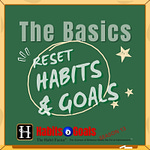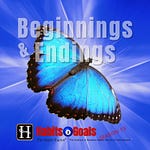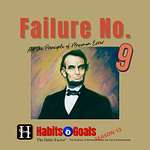This Habits 2 Goals episode is FREE for ALL subscribers.
“The only person you are destined to become is the person you decide to become.”
~ Ralph Waldo Emerson
For centuries, a philosophical debate has raged: Free will vs determinism.
Where do you stand?
Determinism says you have no free will, and that all actions and events are causally inevitable.
Free will suggests that you are a self-determining individual who can and should be accountable for your entire life and all actions that influence it.
Here, again, I suggest the MIDDLE PATH.
“Life is similar to a board game. It has rules, like the laws of physics that govern many outcomes; gravity, time, and space.
But there’s also chance and randomness, just like rolling the dice in Monopoly which influence and alter the outcome; it’s a mix of strategy and luck.
How comforting does “everything happens for a reason” sound when faced with tragedy?
Imagine a tsunami in Indonesia devastating entire communities, or an earthquake in Japan leaving a trail of destruction. Even a seemingly random event like a lightning-struck tree felling a neighbor in their sleep shatters that notion.
This comforting platitude is confusing and even painful for those grappling with senseless loss.
In legal terms, such unpredictable events are often called "Acts of God," acknowledging their seemingly inexplicable nature.
There is an entire TED talk here on little ways you might influence your luck.
The Three Circles of Behavior Echo System sheds light on how our environment shapes us. It includes both predictable and random events, some beyond our control (like natural disasters) and others we can influence (like our daily routines). This model emphasizes the environment's malleability; we can actively change it to support our goals.
Here's why this model is powerful for achieving goals and personal transformation. While new behaviors and skills are crucial, the environment and our mindset (stories) also need to be conducive to our goals.
This model elegantly avoids the extremes of self-determination vs. determinism. It acknowledges that external factors (like random events) can impact us, but it also emphasizes our power to shape our environment and influence our outcomes.
Consider these questions to explore your own “luck”:
Do you believe in luck?
Are you lucky?
How can you shift your perception of luck?
Do you need to rewrite your story about luck?
Enjoy the show!
~mg
The link to the tracking sheet is here: https://thehabitfactor.com/templates
Additional:
Download the free habits-to-goals tracking template to cultivate the habits that support your goals here: https://thehabitfactor.com/templates.
Books that may help "The Power of Positive Thinking" by Norman Vincent Peale and "How to Win Friends and Influence People" by Dale Carnegie.
MG’s Books: EVERYTHING is a F*cking Story, The Pressure Paradox™ & The Habit Factor®
Enjoy the show!
~mg
From the world of statistics: All models are flawed, but some are useful.
We asked Google’s AI experiment Gemini to “break” the “3 Circles of Behavior Echo-System” behavior model.
The short story (no pun intended), is he/she/IT could not.
The best Gemini could offer: “What about people who aren’t aware of their unconscious stories/thinking?”
It’s a good question and a nice attempt. However, an unconscious story is still a story (represented within the model), and that is the point of the latest book, EVERYTHING is a F*cking STORY where the latest version of the model was revealed.
BTW: You are invited to try and “break” the “3 Circles of Behavior Echo-System” behavior model as well.
If you think you can, please email or leave comments here.
*Note: ChatGPT’s does not know the model yet, officially published in October of 2022. GPT’s latest update is from January 2022.
***Get the inspiring, free and world’s first HABITS to GOALS tracking template here: → https://thehabitfactor.com/templates
“The Three Circles of Behavior Echo-System” / The Grunburg Behavior Model is a holistic, fluid, and dynamic behavior-change model. It’s the very first behavior-change model to demonstrate how our thoughts, feelings, behaviors, and even our environment vibrate (echo and reverberate) to influence each other.
Hence, it’s an “Echo-System” not an eco-system. All prior behavior models represent human behavior in a linear-flow type diagram.
Background here.
If you’d like to understand human behavior at an even deeper level, learn more about the “Three Circles of Behavior Echo-System” which is featured in the book, “EVERYTHING!”
I teach and coach organizations and executives and executive coaches worldwide how to best apply and leverage “The Three Circles of Behavior Echo-System” and the P.A.R.R. [Plan, Act, Record & Reassess] scientifically-backed methodology for individual and organizational behavior design.
Check out the latest cohort offering; the waitlist is now open: The 28-Day Breakthrough!
*Recently Awarded: “Finalist: Self-help, Motivation”
International Book Awards: EVERYTHING is a F*cking STORY.
Visit https://thehabitfactor.com/templates
To learn more about P.A.R.R., just Google “P.A.R.R. and The Habit Factor.”
Get The Habit Factor® FREE with your audible trial! https://audibletrial.com/habits2goals
Feedspot’s “Top 10 Habit Podcasts You Must Follow in 2021”
New listeners, grab your free habits 2 goals tracking template here: https://thehabitfactor.com/templates
FREE copy of As a Man Thinketh (PDF) right here: As a Man Thinketh
















Share this post